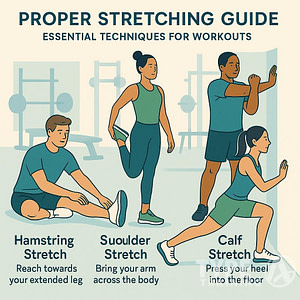Struggling through the morning after a night of indulgence can be tough, especially when you’re considering your fitness routine. You might be wondering if it’s even beneficial or safe to exercise with a hangover.
Yes, you can exercise even with a hangover, but it’s crucial to approach this with caution to avoid injury or prolonged discomfort.
Hydration is key in this scenario, as alcohol significantly dehydrates the body.
Popular posts:
Opt for light exercises like walking or yoga that don’t overstrain your body. Rest when needed and listen closely to what your body is telling you.
Understanding your limits and choosing appropriate exercises can significantly aid in recovery, helping you feel better sooner.
Pay attention to your body’s signals, and prioritize rest and hydration to alleviate hangover symptoms effectively.
Key Takeaways
- Exercise cautiously with a hangover.
- Hydration and rest are essential.
- Choose light exercises for recovery.
Understanding Hangovers
Hangovers affect your body in various ways, such as causing headaches, dehydration, and changes in metabolism. Each aspect plays a crucial role in how you feel after consuming alcohol.
Hangover Symptoms
A hangover typically manifests through a combination of physical and mental symptoms. You may experience headaches, dizziness, nausea, and fatigue.
These symptoms are the result of your body’s reaction to alcohol and its byproducts.
In addition, cognitive impairments such as poor concentration and mood disturbances can affect your daily activities.
These experiences are often caused by dehydration and the impact of toxins that build up during alcohol consumption.
Dehydration and Alcohol
Dehydration is a common result of consuming alcohol due to its diuretic effect, which increases urination and fluid loss.
Alcohol inhibits the hormone vasopressin, leading to the kidneys excreting more water. This loss of fluids can cause symptoms such as thirst, headache, and dry mouth.
To address dehydration, it is crucial to drink plenty of water during and after alcohol consumption.
Replenishing lost fluids is essential to alleviate some of the hangover symptoms and accelerate recovery.
The Impact of Alcohol on Metabolism
Alcohol impacts your metabolism by influencing how your body processes and breaks down substances.
When you consume alcohol, your liver prioritizes metabolizing it into acetaldehyde, a toxic compound.
This process diverts energy away from other metabolic functions, such as breaking down fats and carbohydrates.
As a result, you may feel sluggish and experience fluctuations in your blood sugar levels.
The Pros and Cons of Exercising With a Hangover
Exercising with a hangover can have both benefits and risks. You might experience mood improvements, but it could also impact your physical performance and hydration levels.
Potential Benefits of Exercise
Engaging in physical activity after a night of drinking can boost your mood.
This is due to the release of endorphins, which are chemicals in the brain that act as natural painkillers and mood elevators.
Cardio exercises like walking or light jogging may increase blood circulation.
Enhanced circulation helps your body process alcohol faster. Even mild exercise can help reduce stress, as it encourages deep breathing and relaxation.
The commitment to your fitness routine can foster a sense of normalcy and control over your day.
Keeping active can serve as a positive distraction and help reset your mindset after a night of indulgence.
Risks of Working Out Hangover
Exercising while hungover poses several risks. Dehydration is a major concern, as alcohol consumption leads to fluid loss.
Working out can exacerbate this, making rehydration crucial before any physical activity.
Performance is likely to be impaired when you’re hungover. You may experience decreased strength, coordination, and reaction time, increasing the risk of injury.
Fatigue can also set in faster, limiting your ability to exert yourself effectively.
Engaging in strenuous exercise might place additional stress on your already taxed body.
It is vital to listen to your body and assess whether you’re physically up to the challenge of working out while hungover.
Prioritize your health and recovery over maintaining an exercise routine.
Exercise Safety and Precautions
When exercising with a hangover, it is crucial to address your physical readiness and ensure proper hydration.
Paying attention to your body’s cues is essential to stay safe and prevent any injuries during your workout.
Assessing Your Readiness
Before you start any physical activity, evaluate how you’re feeling.
Consider factors like dizziness, headache, or nausea that might impact your ability to exercise safely. If symptoms are severe, rest might be a better option.
Perform a quick self-check:
- Energy levels: Are you too fatigued?
- Coordination: Is there any dizziness affecting your balance?
These checks can inform whether it’s safe to proceed with your workout or to opt for a lighter routine or rest.
Pre-Exercise Hydration
Dehydration from alcohol is a significant concern when exercising with a hangover.
Begin by drinking plenty of water to rehydrate before starting any workout.
Have at least 16-20 ounces of water and consider sports drinks with electrolytes to restore balance.
Hydration not only aids recovery but also supports muscular function.
Keep a bottle of water handy and sip regularly during your workout to maintain fluid levels and prevent dehydration.
Listening to Your Body
Paying attention to your body’s signals is vital when exercising with a hangover.
Signs of fatigue, dizziness, or nausea should prompt you to slow down or stop. Modify your workout if necessary and focus on low-impact exercises like walking or gentle yoga.
Ignoring warning signs can lead to injury or prolonged recovery time.
Take breaks as needed, and don’t push yourself beyond comfort. Prioritize your well-being to ensure safety during exercise.
Choosing the Right Type of Exercise
When dealing with a hangover, selecting the appropriate activity to do can be crucial for your recovery. Gentle exercises can provide relief, while intense workouts should often be avoided.
Gentle Exercise Options
Engaging in gentle exercises like yoga, walking, or a light jog can be beneficial when you have a hangover.
Yoga helps to relax and stretch your muscles while also focusing on deep breathing, which can improve your circulation and hydration levels.
A leisurely walk outside not only gets your body moving but also boosts endorphins, improving your mood. If you prefer jogging, maintain a slow pace to avoid overexerting yourself.
Listen to your body’s signals and prioritize gentle movements.
Avoiding High-Intensity and Impact Training
High-intensity workouts, such as high-intensity interval training (HIIT) or CrossFit, might be tempting to offset the effects of a hangover.
These require a lot of energy and can exacerbate dehydration, worsening symptoms like headache or dizziness.
Workouts with a high impact can stress your body, making recovery more difficult.
Opt for exercises that prioritize ease and relaxation rather than pushing your limits.
Maintain hydration and take longer breaks if you choose to incorporate any low-intensity exercise.
Exercise Strategies for Optimal Recovery
Balancing exercise and recovery is crucial, especially when dealing with a hangover. Key strategies include prioritizing rest, focusing on proper hydration and nutrition, and exploring various recovery techniques.
The Role of Rest and Recovery
After a night of indulgence, rest becomes essential.
While it might be instinctive to avoid exercise, light activities can aid in recovery.
Opt for gentle movements, like walking or yoga, to help stimulate circulation without adding stress.
Listen to your body: if it calls for more rest, prioritize sleep and downtime.
Adequate rest helps in repairing muscle tissues, rebuilding energy stores, and balancing hormones.
Short workouts, siestas, or even meditation can serve as effective breaks.
Consulting a personal trainer may offer guidance tailored to your recovery needs, optimizing rest and exercise.
Hydration and Post-Exercise Nutrition
Hydration is critical when exercising with a hangover.
Alcohol acts as a diuretic, expelling fluids and essential electrolytes.
Drinking plenty of water before, during, and after exercise combats dehydration.
Consider electrolyte-enriched drinks to replenish lost minerals.
Nutrition also plays a key role.
Eating complex carbohydrates such as whole grains and fruits can replenish glycogen stores and boost energy.
Simple, balanced meals with a mix of carbs and protein provide the necessary fuel for recovery.
Recovery Techniques Beyond the Gym
Exploring recovery techniques outside the gym can supplement your routine.
Techniques like massage therapy enhance circulation and reduce muscle soreness.
Foam rolling and stretching sessions can relieve tension and support flexibility.
Another useful method is contrast water therapy, alternating between hot and cold showers to improve blood flow.
Yoga and breathing exercises not only rejuvenate the body but also calm the mind.
Personal trainers often recommend diverse recovery practices to aid in a holistic healing approach.
Tailoring Your Workouts to Your Condition
When dealing with a hangover, exercise can be beneficial if approached correctly.
Adjust the intensity to match your current energy levels, and consider personalized advice to support your fitness goals.
Modifying Workout Intensity
Adjusting workout intensity is crucial for exercising with a hangover.
Lower-intensity activities like walking or yoga might be more suitable. These exercises are gentle and help keep your energy steady without overwhelming your body.
Consider short bursts of light cardio if you feel up to it.
Activities like cycling slowly or swimming at a comfortable pace can help get your blood circulating.
Stay attuned to your level of tiredness. Dehydration from a hangover can affect this, so drink water before, during, and after your workout.
Avoid pushing yourself too hard, as this may lead to increased fatigue.
Personalized Training Guidance
Tailoring your workouts can include seeking advice from a personal trainer.
Trainers can offer insights based on your gender, fitness goals, and current condition.
They can help modify exercises to maintain safety and minimize discomfort.
Set realistic goals, especially when dealing with hangover symptoms.
If guided assistance isn’t an option, consider using fitness apps that can offer personalized workout routines.
These tools can help you adjust your plan based on how you feel each day. This ensures that you maintain some level of activity without overexerting yourself or causing additional stress on your body.
Lifestyle Considerations and Long-Term Health
Exercise can significantly impact your recovery post-hangover, addressing brain fog and other symptoms.
Understanding how alcohol affects long-term health and incorporating regular fitness routines are essential.
Alcohol’s Long-Term Effects on Fitness
Alcohol consumption can negatively impact your fitness levels by affecting muscle recovery and strength.
Frequent drinking could lead to increased fat retention and hinder weight loss goals. It may also lead to nutritional deficiencies, impacting your energy and endurance.
Over time, alcohol might also increase the risk of chronic diseases that affect heart health and liver function.
Brain fog is a common short-term effect, but regular alcohol use may harm cognitive function.
Fitness routines may be disadvantaged by these prolonged drawbacks, decreasing your progress and overall well-being.
Incorporating Regular Exercise for Better Health
Regular exercise can combat the adverse health effects of persistent alcohol use.
Engaging in consistent workouts helps strengthen your heart and improve circulation, counteracting some negative impacts on cardiovascular health.
Additionally, exercise aids in weight management and boosts metabolic rate, supporting your weight loss endeavors.
Physical activity can enhance mental clarity and help reduce brain fog, common with alcohol use.
Incorporating aerobic exercises, like running or swimming, can help detoxify the body.
Consider starting with lighter activities, gradually increasing intensity as your body regains strength and endurance.
Consistent exercise promotes long-term health by supporting both physical and mental wellness.
Frequently Asked Questions
When exercising with a hangover, it’s important to consider safety, the timing of your workout, and any physical limitations you might experience. Some exercises can be more beneficial than others, and certain fitness considerations should be kept in mind.
Is it safe to exercise while experiencing hangover symptoms?
Exercising with a hangover can be risky.
Your body may be dehydrated, and you might experience dizziness, fatigue, or nausea.
Pay close attention to how you’re feeling, and don’t push yourself beyond comfortable limits.
It’s always wise to prioritize rest if symptoms are severe.
Can engaging in physical activity alleviate hangover effects?
While some find that light exercise helps improve their mood, it’s not a guaranteed solution for everyone.
Mild physical activity may promote endorphin release and boost energy levels, but don’t expect it to completely eliminate hangover symptoms.
Listen to your body and adjust your activity level accordingly.
How long after consuming alcohol should one wait before exercising?
It’s advisable to wait until you’re no longer feeling significantly impaired by alcohol before exercising.
A good rule of thumb is to assess how you feel the next morning. Ensure you’ve had adequate sleep and hydration before engaging in workouts post-alcohol consumption.
What are the best types of exercise for dealing with a hangover?
Low-impact exercises like walking, yoga, or stretching can be beneficial.
These activities promote blood circulation and may help alleviate some hangover discomfort without putting too much strain on your body.
Avoid high-intensity or high-impact workouts which can lead to further dehydration and fatigue.
Are there any specific fitness considerations when working out post-drinking?
Ensure you hydrate properly before, during, and after exercise.
Consider having a light snack to stabilize blood sugar levels.
Be cautious with exercises requiring balance or coordination, as these skills may be temporarily altered.
Modify routines according to how you feel.
Does sweating during a workout help in eliminating hangover toxins?
Sweating doesn’t effectively reduce hangover symptoms or remove alcohol from your system.
Alcohol is primarily metabolized through the liver. Focus instead on hydration, rest, and consuming nutrients to help your system recover.
Exercise can still be part of a mixed approach to feeling better.















